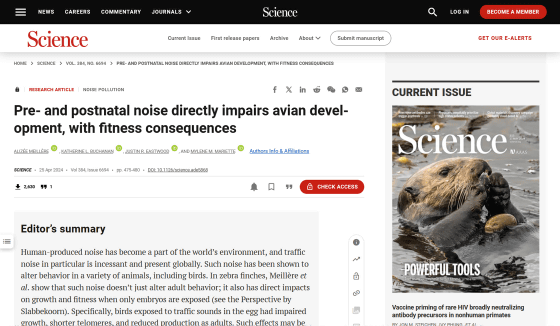Research shows that traffic noise not only slows the growth of chicks but also reduces the chances of eggs hatching

Noise from cars, trains and other sources not only has
Pre- and postnatal noise directly impairs avian development, with fitness consequences | Science
https://www.science.org/doi/10.1126/science.ade5868

Traffic noise causes lifelong harm to baby birds | Science | AAAS
https://www.science.org/content/article/traffic-noise-causes-lifelong-harm-baby-birds
Noise from traffic stunts growth of baby birds, study finds | Birds | The Guardian
https://www.theguardian.com/environment/2024/apr/25/noise-from-traffic-stunts-growth-of-baby-birds-study-finds
Researchers have previously known that excessive noise can negatively affect nest building and rearing in breeding birds, and that noise can disrupt communication between birds, but it was unclear whether birds feel distressed by noise from the chick stage, or how noise disrupts the bird's habitat and rearing.
So a research team led by Mylène Mariette , a behavioral ecologist at Deakin University in Australia, conducted an experiment using zebra finches kept in an aviary.
The researchers exposed zebra finch eggs to 65 decibels of traffic noise or zebra finch calls for several hours per night for five consecutive days. Once the eggs hatched and the chicks were born, they were exposed to similar noise for about four hours per night for up to 13 days. The parents, who were caring for the chicks, were not exposed to the traffic noise or calls.

The results showed that average-sized eggs exposed to traffic noise were 19% less likely to hatch than those exposed to bird calls. Additionally, although larger eggs are usually easier to hatch, exposure to traffic noise also made them less likely to hatch than smaller eggs.
As the chicks grew, there were developmental differences between those exposed to traffic noise and those exposed to chirping: The traffic noise-exposed chicks were over 10% smaller in size and over 15% lighter than the other chicks, and they also had lower concentrations of red blood cells.
Moreover, the adverse effects of exposure to traffic noise from just before hatching until a few days after hatching persisted even after the chicks were no longer exposed to the noise. By the time the chicks reached breeding age four years later, the birds exposed to traffic noise early in their lives had produced less than half the offspring of the other birds.

'Sound is much stronger than we previously understood and has a direct impact on bird development,' Mariette said. 'It would be wise to make more efforts to reduce noise pollution.'
Hans Slabbekorn, an acoustic ecologist at Leiden University in the Netherlands who was not involved in the study, said: 'The findings suggest that we should better manage the acoustic environment of birds breeding in urban areas and along highways. Special attention should also be paid to the acoustic comfort of hospitals for pregnant mothers and their babies.'
Related Posts:







